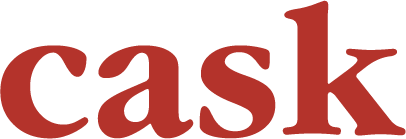Third-generation CEO Peter Love is overseeing the Canadian manufacturer’s international growth from the U.K. to Bhutan.
- www.cask.com
- Calgary, Alberta
- Founded: 1905
- Privately owned
- Employees: about 25
In the early 1900s, J.E. Love & Sons would do “anything for a buck,” laughs Love. Then the company spun a subsidiary off into the brewing industry in the 1970s, branding itself Cask the subsequent decade.
The business plan veered from supplying barley and brewing equipment to opening 120 brew on premise (BOP) locations. The latter business proved especially good in Canada and Australia, thanks to high beer taxes.
BOP customers demanded the convenience of canning, leading to the development of tabletop filling and seaming systems first used in-house before Cask led the craft beer industry’s charge from glass to aluminum starting at the Craft Brewers Conference in Cleveland in 2002.
Cask famously supplied Oskar Blues with a tabletop system for the first hand-canned Dale’s Pale Ale in 2002.
Dale [Katechis] was fun to work with,” says Love. “He flew up to Calgary. He couldn’t wait to get his hands on it.

The company has since sold equipment to Tommyknocker, Avery, Wynkoop, Ska, and other Colorado brewers as well as breweries east and west. In all, Cask has shipped about 600 systems to an increasingly international market that now spans 34 countries.
It’s a really interesting phenomenon to watch,” says Love. “The craft beer craze is going worldwide.
Innovation remains a priority at Cask. “We developed the microcanning thing to start with and we try to stay on top of it,” says Love. The manufacturer’s lines can handle different heights and widths and are designed with space constraints in mind.
The second iteration of Cask’s Automated Canning System is new for summer 2015. Dubbed the ACS X2, it can fill about 80 cans a minute and handle multiple can heights. Priced at $169,990, it’s Cask’s first six-digit machine.
But the company is known for its entry-level canning options. Love calls the popular Semi-Automated Canning System a “mid-market” machine — priced around $50,000 — that fills 15 cans a minute and only occupies 10 square feet. Cask’s manual filler/seamer is an even thriftier option, with a price tag that’s less than $20,000. It fills about four cans a minute.

The market continues to respond to Cask’s product range. “We’re around 30 percent a year growth,” Love says. “I’ve been on the other side and it’s nice to be on the upside of something exciting. But it’s a push.”
Now 10 years into its second century, Cask is going to remain a family business. “The fourth generation’s coming,” Love explains. “I’ve got two sons coming in.”
Favorite beers: Red Racer IPA and Dale’s Pale Ale. “It’s tough to get up here but it’s one of my favorites,” says Love of the latter.
Challenges: “I get calls from Australia at night and I get calls from South Africa and Europe in the morning,” says Love. “We’re open from 6 a.m. to 6 p.m. now, but we might extend that a little longer.”
Opportunities: Exports. Calling cans as an inevitable part of every craft beer market, Love cites opportunities in the U.K., Australia, Scandinavia, South Korea, and South Africa. He says Cask is supplying the soon-to-be most northernmost brewery in the world in Svalbard, Norway, and has another system in place in the Himalayas in Bhutan.
“It’s going really well,” Love says of the company’s international push, noting that the company added the word “global” to its name in 2012. “I’m a little concerned about the U.S. market. There’s 11,500 SKUs of craft beer. There can be an awful lot of people on the bottom rung.”
Love also says canned cold-brewed coffee could be the next big thing and sees coffee roasters as potential customers.
Needs: “Talented people,” says Love. “It takes a long time to train people. It’s a six- to nine-month process. But with a slump in Alberta’s oil patch, that looks to be changing. “It’s really freed up a lot of good talent,” he says. “We’ve picked up some great people.”
Another: more space. Love says Cask has maxed out its 8,000-square-foot facility in Calgary and is looking for someplace bigger. “We’re probably going to double that.”
